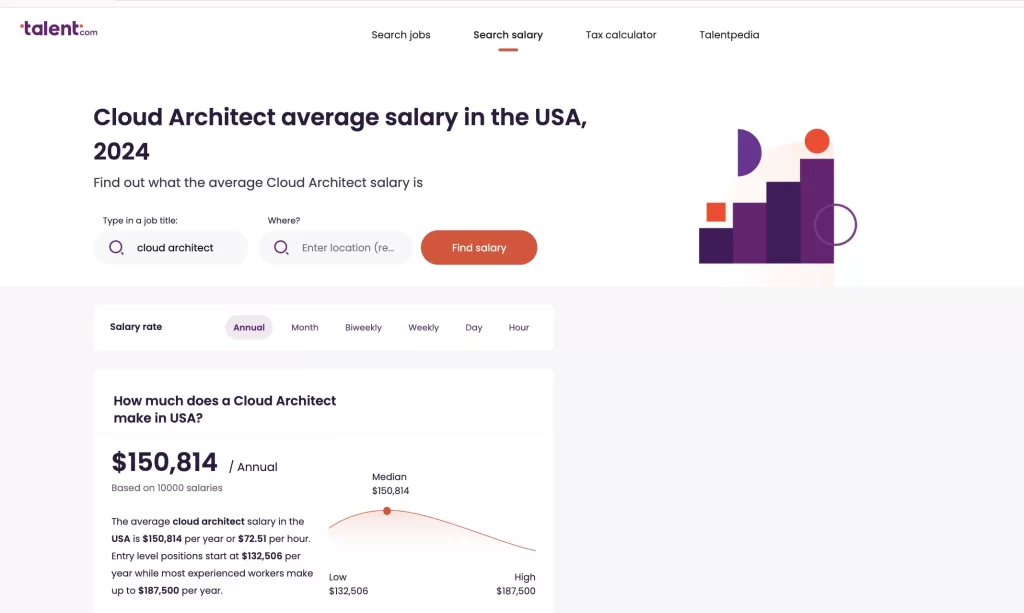In this article, we’ll explore the complexity of Cloud solutions Architect salaries, considering diverse factors that contribute to this variation. And, delve into actionable strategies, presenting effective ways to potentially double your Cloud Solutions Architect role salary within 12 months. Let’s dig in!
What is the role of a Cloud Solutions Architect?
A cloud solutions architect is an expert specialised in designing, constructing, and administering cloud computing systems. The role involves collaborating with clients to assess their requirements and devising tailored systems to fulfil those needs. They also collaborate with developers throughout the system construction phase and oversee its management post-implementation. A typical Cloud solutions architect possesses a bachelor’s degree in computer science or a closely related discipline, along with practical experience in cloud computing architecture, and some employers may require certification in cloud computing as well.
How Much Do Cloud Architects Earn?
The demand for Cloud Architect jobs is on the rise, driven by the widespread adoption of cloud computing. Cloud Architects play a crucial role within companies, and their elevated responsibilities often translate into higher-ranking positions, resulting in higher average salaries. Factors such as location, industry, and job experience influence the salary of a Cloud Architect. Despite variations in individual salaries, the average annual income for Cloud Architects hovers around $150,000. While the seasoned Professional Cloud Architects with extensive industry experience are often more adept at contributing to business success, they often justify higher salary expectations.
Image : cloud architect average salary
How to Double a Cloud Solutions Architect Salary in 12 Months?
By strategically navigating the realms of skills enhancement, certifications, and strategic career moves, you can pave the way for a significant financial leap in the rapidly evolving landscape of cloud architecture.
Let’s delve into actionable steps and proven methodologies that can propel your Cloud Solutions Architect salary to new heights within one year.
1. Invest in advanced certifications.
Being certified not only builds technical knowledge but also showcases that your skills are up to date. Holding certifications from different cloud vendors helps in choosing which is right for the company that hires you.
The more you get certified, the more skills you will gain. Choose the certifications you are interested in or those needed by your current employer. So, it is recommended to invest in some of the cloud solutions architect certifications, such as
- AWS Certified Solutions Architect – Professional
- Microsoft Certified: Azure Solutions Architect Expert
- Google Professional Cloud Architect
- Microsoft Certified: Azure Fundamentals
- CompTIA Cloud+
- AWS Certified Solutions Architect – Associate
Employers actively seek professionals with proven expertise, and holding these certifications positions you as a top-tier candidate for roles such as Lead Solutions Architect or Cloud Architect Manager. Investing in those certifications also adds weight to your resume and establishes you as a credible candidate with in-depth knowledge of cloud platforms.
2. Sharpen your skills in Multi-cloud.
Nowadays, many companies are migrating to multi-cloud technology. This vital growth increased the demand for professionals who are adept in diverse cloud technologies. Therefore, enriching key skills in multi-cloud platforms such as AWS, Azure, and Google Cloud can be worth it.
Gain expertise in multi-cloud networking, including setting up secure connections between different cloud providers. And know how to design and implement global load balancing, VPNs, and other networking components in a multi-cloud environment.
Becoming a versatile Cloud Solutions Architect with multi-cloud expertise positions you for success in a dynamic and competitive IT landscape.
3. Specialisation in Demand
As a solution architect, you will know how important it is to secure the cloud infrastructure from security threats. In this digital era, massive data has been generated and processed in a cloud environment, which has increased the demand for individuals who can guard the cloud network with some specialised skills.
Thus, specialising in designing and implementing robust security measures tailored for cloud infrastructures is essential. You must focus on high-demand areas such as cloud security, machine learning, or DevOps to become a specialist in sought-after skills.
Specialisation in these areas can benefit in the following ways
- Market Relevance: Specialising in high-demand areas ensures that your skills remain relevant and aligned with industry trends.
- Career Opportunities: Organisations actively seek specialists in these domains, offering a wealth of career opportunities and the potential for advancement.
- Increased Value: Specialised skills often come with a higher perceived value in the job market, leading to competitive compensation packages.
- Contribution to Innovation: Specialising in emerging technologies allows professionals to contribute to innovative solutions, staying at the forefront of technological advancements.
4. Network Building
Networking opens doors to high-paying roles. By establishing connections with industry leaders and decision-makers, you increase your visibility for potential job opportunities. Often, professionals hear about exclusive job openings or are referred to high-paying roles through their network.
Network building also facilitates knowledge sharing. Engaging with professionals in your field allows you to stay updated on industry trends, best practices, and potential challenges. This exchange of knowledge is invaluable for professional growth and staying competitive in your career.
5. Exploring the Job Market
Possessing the right skills is invaluable until it is actively utilised and exposed. Don’t limit yourself! Research for any jobs available in the market and apply for them. There are a lot of hidden opportunities available for skilled and experienced professionals. While applying for the job, keep in mind that the sectors are known for rewarding cloud architects.
Securing multiple offers can strengthen your negotiation position and know your market value. Just as there are diverse pathways to becoming a cloud architect, the field also offers a variety of specialised roles. Cloud architects can focus on different areas such as application development, cybersecurity, and data management.
In-demand Cloud Solutions Architect Jobs You Can Try
AWS Solutions Architect: They are mainly involved in designing, building, and managing solutions in the AWS cloud. Also, they are responsible for securing the cloud environment and assessing risks associated with third-party cloud providers. The average total yearly pay for an AWS Solutions Architect in the US is found to be $190,720.
Azure Cloud Architect: Azure Cloud Architects employ Microsoft Azure to create and implement cloud solutions. They also provide systems support and ensure client needs are met through workshops. They get an average yearly pay of about $179,851.
OpenStack Architect: An OpenStack Architect employs the open-source cloud infrastructure, OpenStack, to intricately design and manage cloud solutions. Their tasks extend to working with both private and public clouds, encompassing vital functions such as virtualisation. The average annual salary for this role in the United States stands at $162,073.
Cloud Network Architect: A Cloud Network Architect is focused on evaluating and enhancing the efficiency and performance of cloud network environments. They develop strategic approaches for the management of cloud networks and stay abreast of emerging technologies in the field. The average yearly pay for this role in the US is $170,077.
Cloud Platform Architect: The role of a Cloud Platform Architect revolves around the design and deployment of cloud platforms. These professionals assume leadership in implementing processes, mentoring team members, and overseeing various projects within the cloud platform domain. The average annual pay for Cloud Platform Architects in the US is $216,643.
Cloud Infrastructure Architect: A Cloud Infrastructure Architect holds the responsibility of overseeing the entire cloud ecosystem. This includes designing and implementing comprehensive cloud solutions, monitoring the cloud environment, and engaging in contract negotiations with service providers. The average total yearly pay for Cloud Infrastructure Architects in the US is $209,975.
Cyber Solutions Architect: A Cyber Solutions Architect specialises in safeguarding the security of cloud-based platforms and applications. Their role encompasses tasks such as penetration testing, overseeing network changes, and implementing firewall measures. The average yearly pay for Cyber Solutions Architects in the US is $167,375.
Junior Cloud Solutions Architect: For those in entry-level positions, a Junior Cloud Solutions Architect undertakes tasks related to the creation of front-end or back-end cloud platforms. Their role may involve interaction with clients or executives, particularly when working on front-end platforms. The average annual pay for Junior Cloud Solutions Architects in the US is $187,353.
Principal Cloud Architect: Stepping into a leadership role, a Principal Cloud Architect assumes a pivotal position in creating the framework, architecture, and design of cloud platforms. Beyond technical expertise, they guide team members and serve as liaisons between the IT department and other organisational divisions. The average total yearly pay for Principal Cloud Architects in the US is $240,240.
Senior Cloud Architect: You must have extensive technical knowledge of various cloud platforms to become an expert in the cloud architect role. Their core responsibility is to design and deploy cloud computing technologies, and they closely work with cloud engineers and IT team members. The average total yearly pay of a Senior Cloud Architect is about $219,227.
6. Leading high-impact projects
Taking ownership of critical, complex projects showcases your ability to deliver tangible results. It also helps to gain experience in how to manage incidents effectively by engaging with teams. You can also sort your weaknesses while handling complex projects.
Demonstrating successful migration experiences, particularly for large enterprises, can make you an indispensable asset and increase your market value.
When trying for a new position, you will be noticed by employers and positioned in a high-paying position without a doubt.
7. Develop Leadership and Management skills.
To be a successful Cloud solutions architect, you must have the leadership and management skills to transition beyond the technical roles.
In general, Cloud Solutions Architects lead teams, communicate effectively with stakeholders, and align cloud strategies with business objectives.
Cloud Solutions Architects who can articulate technical concepts in a clear and business-oriented manner establish stronger connections with stakeholders and also facilitate a better understanding of the value of cloud strategies.
For successful projects, Cloud Solutions Architects lie as a major backbone by aligning the cloud strategies with the objectives defined by an organisation. This increased responsibility often corresponds to higher compensation.
FAQs
1. What is the basic salary for an entry-level Cloud Architect?
Cloud Architects enjoy good salaries, even at the entry level. For a non-voice Cloud Architect engineer, the base salary ranges between $120,000– $140,000.
2. What are the Factors Influencing Cloud Architect Salary?
As professionals accumulate knowledge and experience in the industry and cloud computing, their value to the company increases, thereby contributing to salary growth.
3. What is the average Salary for an Experienced Cloud Architect?
The average annual salary for a skilled Azure Cloud Architect is approximately $167,000.
4. Is Cloud Architecture a Good Career?
Yes. Pursuing a career in cloud architecture is highly advantageous. This field allows professionals to make meaningful contributions to technology projects and is rapidly emerging as one of the most lucrative and sought-after positions within the tech industry.
Conclusion
Focusing on enhancing your skills, getting certifications, and leveraging opportunities for career advancement, to position yourself for substantial financial growth in the dynamic field of cloud architecture. As you start this journey, keep in mind that commitment, continuous learning, and strategic career moves are key elements to achieving the goal within the specified timeframe. Whizlabs has multiple resources, including Practice tests, video content, hands-on labs, and Sandboxes, making your preparation easy. Best of luck on your path to professional and financial success in the world of cloud architecture!
- Top 25 AWS Data Engineer Interview Questions and Answers - May 11, 2024
- What is Azure Synapse Analytics? - April 26, 2024
- AZ-900: Azure Fundamentals Certification Exam Updates - April 26, 2024
- Exam Tips for AWS Data Engineer Associate Certification - April 19, 2024
- Maximizing Cloud Security with AWS Identity and Access Management - April 18, 2024
- A Deep Dive into Google Cloud Database Options - April 16, 2024
- GCP Cloud Engineer vs GCP Cloud Architect: What’s the Difference? - March 22, 2024
- 7 Ways to Double Your Cloud Solutions Architect Role Salary in 12 Months - March 7, 2024


